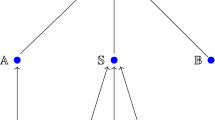Abstract
The first invariance principle, called “meaningfulness,” is germane to the common practice requiring that the form of a scientific law must not be altered by a change of the units of the measurement scales. By itself, meaningfulness does not put any constraint on the possible data. The second principle requires that the output variable is “order-invariant” with respect to any transformation (of one of the input variables) belonging to a particular family or class of such transformations which are characteristic of the law. These principles are formulated as axioms of a theory. Taken together, meaningfulness and order-invariance axioms have strong consequences on the feasible theories. Three applications of our results are discussed in details, involving the Lorentz–FitzGerald contraction, Beer's law, and the Monomial laws, each of which is derived from three axioms implementing meaningfulness and order-invariance concepts. (An “initial condition” axiom is also used.) Not all scientific laws are order-invariant in the sense of this paper. An example is van der Waals' equation.
Similar content being viewed by others
REFERENCES
C. F. Hix and R. P. Alley, Physical Laws and Effects (Wiley, New York, 1958).
R. D. Luce, D. H. Krantz, P. Suppes, and A. Tversky, Foundations of Measurement,Vol. 3, Representation, Axiomatization, and Invariance (Academic Press, San Diego, 1990).
L. Narens, Theories of Meaningfulness (Lawrence Erlbaum Associates, New Jersey, 2002).
J.-Cl. Falmagne and L. Narens, "Scales and meaningfulness of quantitative laws, " Synthese 55, 287–325 (1983).
R. D. Luce. "On the possible psychological laws, "Psychol. Rev. 66 (2), 81–95 (1959).
W. W. Rozeboom, "The untenability of Luce 's principle, "Psychol. Rev. 69, 532–547 (1962).
W. W. Rozeboom, "Comment, "Psychol. Rev. 69, 552 (1962).
R. D. Luce, "Comments on Rozeboom 's criticisms of 'On the Possible Psychophysical Laws ', "Psychol. Rev. 69, 548–551 (1962).
E. Adams, "Nature and purpose of measurement, "Synthese 16, 125–169 (1966).
J. Aczél, F. S. Roberts, and Z. Rosenbaum, "On scientific laws without dimensional constants, "J. Math. Anal Appl. 119, 389–416 (1986).
J. Aczél and Z. Moszner, "New result on "scale "and "size "arguments justifying invariance properties of empirical indices and laws, "Math. Social Sci. 28, 3–33 (1994).
P. Suppes, Representation and Invariance of Scientfic Structures (CSLI Publications, Stanford, CA, 2002).
J.-Cl. Falmagne, Elements of Psychophysical Theory (Oxford University Press, New York, 1985, reprinted 2004).
C. Doble, "Of invariance properties of empirical laws, "Technical Report 02–04, Institute for Mathematical Behavioral Sciences, University of California, Irvine (2002).
D. H. Krantz, R. D. Luce, P. Suppes, and A. Tversky, Foundations of Measurement,Vol. 1, Additive and Polynomial Representations (Academic Press, New York, 1971).
J. Aczél, Lectures on Functional Equations and their Applications (Academic Press, New York, 1966).
D. H. Krantz, R. D. Luce, P. Suppes, and A. Tversky, Foundations of Measurements,Vol. 2, Geometrical, Threshold, and Probabilistic Representations (Academic Press, New York, 1989).
F. S. Roberts, Measurement Theory, with Applications to Decisionmaking, Utility, and the Social Sciences (Addison-Wesley, Reading, MA, 1979).
Author information
Authors and Affiliations
Rights and permissions
About this article
Cite this article
Falmagne, JC. Meaningfulness and Order-Invariance: Two Fundamental Principles for Scientific Laws. Foundations of Physics 34, 1341–1384 (2004). https://doi.org/10.1023/B:FOOP.0000044096.50863.8e
Issue Date:
DOI: https://doi.org/10.1023/B:FOOP.0000044096.50863.8e




